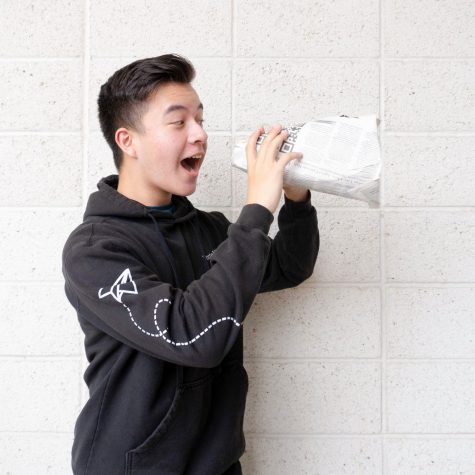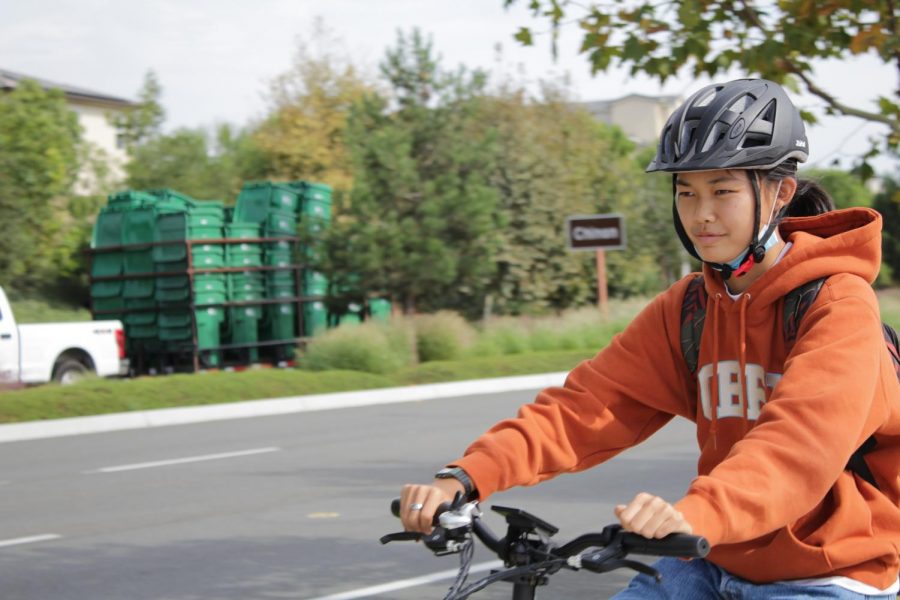Wearing a Helmet Doesn’t Prevent Biking Accidents: Being Defensive Does
While freshman Shifa Harsolia was biking from school on Sept. 10, a distracted driver on Irvine Blvd. crashed into her, knocking her off of the bike.
“I was mainly just really shocked because it just came out of nowhere,” Harsolia said. “I wasn’t expecting it because I was kind of glancing at the car to see if he noticed me, and then I thought he knew I was going, and then he just hit me, and then I fell really hard on my back.”
Minutes after the collision, Harsolia was escorted by her mother to an urgent care facility in Irvine, where she learned she sustained mild injuries including a bruised back. The front wheel of her bike — hit directly during the impact — was mutilated and skewed inwards.
“It was just scary because I had right-of-way, I was doing everything I was supposed to, and it just came out of nowhere,” Harsolia said. “I usually think that all the drivers are paying attention, and I don’t need to worry about them; I just need to worry about myself. But now I have to be a more defensive biker.”
“Wear a helmet.” “Look out for traffic.” “Make eye contact with the driver.” Safe biking practices are persistently drilled and re-drilled into students’ heads. But for Harsolia, adhering to biking laws alone was not enough to protect her from a dangerous collision with a vehicle.
Around 846 vehicular collisions involving cyclists took place during 2019 alone, according to the National Highway Traffic Safety Administration. That same year, 133 cyclists were killed in California, making it one of the most dangerous states for bikers.
Distracted driving, a failure to yield to oncoming bikers and turning without looking represent the most common road violations leading to dangerous vehicle-biker collisions. For senior Betty Liu, who has biked to and from Portola High since her sophomore year, the prospect of drivers turning blindly at an intersection demands a defensive response from bikers.
“[Drivers] actually don’t really watch out for the kids sometimes, so they just turn without looking towards us to see if there’s anyone still going to pass,” Liu said. “It’s so easy to get in trouble if you don’t watch out.”
From a driver’s standpoint, driving close to a school campus entails many defensive precautions. According to school resource officer Melissa Porter, whose two children bike to school, drivers often rely on reverse cameras rather than using their mirrors to check for road obstructions in school zones and parking lots.
Bikers are not any more exempt from road safety practices than drivers. Among the biggest misconceptions bikers have is the assumption that other vehicles know to stop for them, especially with unexpected biking maneuvers, according to Porter.
“I think that [bikers] think the crosswalk has like a force field around some type of shield when they get in there, like they’re oblivious to anything that can happen to them,” Porter said. “There’s a ton of stuff that people are doing whether they’re driving, talking, eating, reading something, messing with a radio, cell phones … a lot of stuff going on.”
While many instances of rule-breaking on the road manifest in irreverence or forgetfulness, some can result from peer pressure. Many biking accidents are products of a careless – and deliberate – disregard for well-known, well-iterated road safety principles like not wearing helmets properly, crossing intersections without looking for oncoming traffic and riding with headphones in both ears, according to Portola area traffic officer Brian Smith.
“We’ve all done dumb things; I get that, but don’t be a follower,” Smith said. “You ride safely. You want to get home.”
Biking collisions can have scarring, far-reaching effects on not only the biker involved, but a plethora of other parties, according to Smith.
“It’s not just having to deal with an injured person. It’s the aftermath of the family that has now their child’s been injured,” Smith said. “Then we have the person that actually hit them, and they have the trauma of having to live with that: the fact that they hit a kid or somebody else.”
The Irvine Police Department works in tandem with Irvine Unified and the City of Irvine to educate students on safe biking practices with informational forums and driving safety programs like Smart Start. Taking the initiative to learn about safe road practices is a universal responsibility.
However, written handbooks on their own cannot un-distract a distracted driver or render an unaware biker receptive to their surroundings. The responsibility of defensive road travel lies in the hands of drivers – and bikers alike.
Because after all, safety is not a matter of blind, recoverable mistakes: it is a matter of life and death.
Your donation will support the student journalists of Portola High School. Your contribution will allow us to purchase equipment and cover our annual website hosting costs.

Ryne Dunman is the Co-Editor-in-Chief for his second and final year on the Portola Pilot. This year, he’s excited to make new memories in-person and...

Jana Malek is a staff writer for the Portola Pilot. She is excited to spend her final year running around with a camera behind deadline. When she's not...





